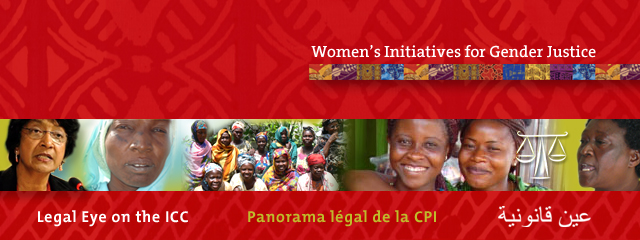|
|
||
|
||
 |
||
December 2013 |
||||
Welcome to the |
||||
|
||||

The Women's Initiatives for Gender Justice is an international women's human rights organisation that advocates for gender justice through the International Criminal Court (ICC) and through domestic mechanisms, including peace negotiations and justice processes. We work with women most affected by the conflict situations under investigation by the ICC. The Women's Initiatives for Gender Justice works in Uganda, the Democratic Republic of the Congo, Sudan, the Central African Republic, Kenya, Libya and Kyrgyzstan. Offices 
|
Dear Friends,Welcome to the December 2013 issue of Legal Eye on the ICC, a regular eLetter from the Women's Initiatives for Gender Justice. In the Legal Eye you will find summaries and gender analysis of judicial decisions and other legal developments at the International Criminal Court (ICC), and discussion of legal issues arising from victims' participation before the Court, particularly as these issues relate to the prosecution of gender-based crimes in each of the Situations under investigation by the ICC. The Court currently has eight Situations under investigation: Uganda, the Democratic Republic of the Congo (DRC), Darfur (Sudan), the Central African Republic (CAR), Kenya, Libya, Côte d'Ivoire and Mali. In addition to the Legal Eye on the ICC, we also produce Women's Voices, a regular eLetter providing updates and analysis on political developments, the pursuit of justice and accountability, the participation of women in peace talks and reconciliation efforts from the perspective of women's rights activists within armed conflict situations, specifically those countries under investigation by the ICC. More information about the work of the Women's Initiatives for Gender Justice and previous issues of Women's Voices and Legal Eye on the ICC can be found on our website at www.iccwomen.org. Women's Initiatives for Gender Justice launches Expert Paper :: Modes of Liability — A review of the International Criminal Court's current jurisprudence and practiceThe Expert Paper on modes of liability, the first of a new series, was launched by the Women’s Initiatives for Gender Justice in The Hague at the 12th Session of the Assembly of States Parties on 28 November 2013, and is available on our website here. Currently modes of liability, the legal theories connecting an alleged perpetrator to the crimes charged, are among the most debated aspects of the cases before the International Criminal Court (ICC). There is a lack of consensus between and within the Trial and Pre-Trial Chambers on how the modes of liability are to be interpreted, and this aspect of the case has also been the subject of multiple filings by the Prosecution, Defence and Legal Representatives of Victims. This important new resource provides an in-depth study of how the Court has treated the various modes of liability outlined in the Rome Statute, signalling those issues generating particular diversity in the interpretation of the relevant provisions and in their application in specific cases. The Paper focuses on decisions that propose alternative interpretations of the elements of the modes of liability, highlighting those which remain contested, and those around which a body of agreement is coalescing. The Expert Paper summarises the judicial interpretations to date of Articles 25 and 28, with specific reference to each mode of liability within those provisions, their associated elements, and the relevant cases and decisions, including the decisions currently available in which modes of liability have been applied to gender-based crimes. The Paper also reviews changes to the modes of liability: in the pre-trial phase for arrest warrants and summonses to appear; in adjournments in confirmation proceedings pursuant to Article 61(7)(c); and through the application of Regulation 55 at the trial phase. At this relatively early stage of the ICC’s practice, the Expert Paper does not draw conclusions or make recommendations, but is intended to serve as a clear source of information about this developing area of international criminal law. The Modes of Liability Expert Paper also includes innovative charts, illustrating an overview of all modes of liability charged, and any judicial interpretations and changes, at the ICC from 1 January 2004 to 1 November 2013, and setting out key holdings by Chambers with respect to individual elements of the modes of liability in the Statute, highlighting distinctions and variances in interpretation. Future publications in this series will include an expert paper on victim participation before the ICC. |
|
|
||||||||||||||||||||||||||
|
